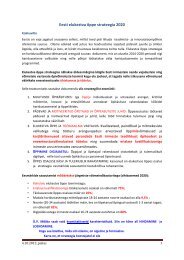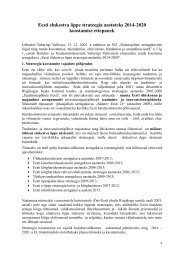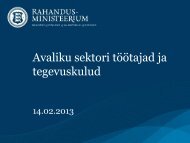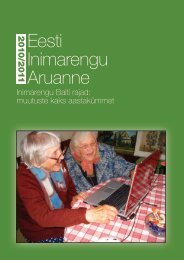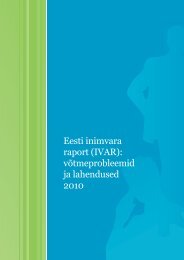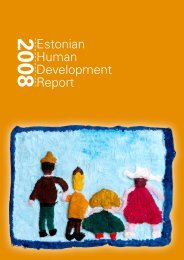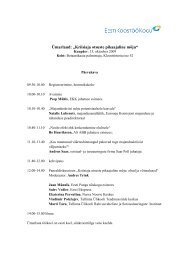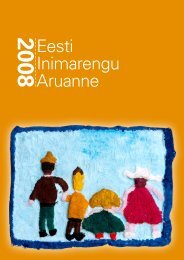DEVELOPMENT
The pdf-version - Eesti Koostöö Kogu
The pdf-version - Eesti Koostöö Kogu
Create successful ePaper yourself
Turn your PDF publications into a flip-book with our unique Google optimized e-Paper software.
of possible problems with the methodology of the World<br />
Values Survey, and the fact that the survey includes far<br />
from all of the values that people may consider to be<br />
important in their lives, this is probably the best attempt<br />
so far for comparing the value preferences of various peoples<br />
over time. Estonia’s position on the cultural map of<br />
the world – with a strong focus on secular-rational values,<br />
but also on values related to survival – reflects, to a great<br />
extent, our position on the geopolitical map, on the crossroads<br />
between Northern and Eastern Europe. Thus, we<br />
cannot help that Estonia’s actual position on both maps<br />
diverges somewhat from the position in which we would<br />
wish, or imagine, ourselves to be, which is closer to the<br />
Nordic ideal.<br />
References<br />
1. Abramson, P. R. (2011). Critiques and Counter-critiques of the<br />
Postmaterialism Thesis: Thirty-four years of Debate. CSD Working<br />
Papers, Center for the Study of Democracy, UC Irvine. http://<br />
escholarship.org/uc/item/3f72v9q4<br />
2. Allik, J. & Realo, A. (2004). “Individualism-collectivism and<br />
Social Capital,” Journal of Cross-Cultural Psychology, 35(1), 29<br />
–49. doi: 10.1177/0022022103260381<br />
3. Eisenstadt, S. N. (2000). “Multiple Modernities,” Dædalus, 129,<br />
1–29.<br />
4. Hofstede, G. (1980). Culture’s Consequences: International<br />
Differences in Work-related Values. Beverly Hills, CA: Sage.<br />
5. Hofstede, G. (2001). Culture’s Consequences: Comparing Values,<br />
Behaviors, Institutions and Organizations across Nations (2 ed.).<br />
Beverly Hills, CA: Sage.<br />
6. Inglehart, R. (1990). Culture Shift in Advanced Industrial<br />
Societies. Princeton: Princeton University Press.<br />
7. Inglehart, R. (1997). Modernization and Postmodernization:<br />
Cultural, Economic and Political Change in 43 Societies. Princeton:<br />
Princeton University Press.<br />
8. Inglehart, R. (2006). “Mapping Global Values,” Comparative<br />
Sociology, 5, 115–136.<br />
9. Inglehart, R. & Baker, W. E. (2000). “Modernization, Cultural<br />
Change, and the Persistence of Traditional Values,” American<br />
Sociological Review, 65, 19–51.<br />
10. Inglehart, R., Basanez, M., Diez-Medrano, J., Halman, L. &<br />
Luijkx, R. (2004). Human Beliefs and Values: A Cross-cultural<br />
Sourcebook Based on the 1999–2002 Values Surveys. Mexico:<br />
Siglo XXI Editores.<br />
11. Inglehart, R. & Oyserman, D. (2004). “Individualism, Autonomy,<br />
and Self-expression,” Vinken, H., Soeters, J. & Ester, P. (Eds.),<br />
Comparing Cultures: Dimensions of Culture in a Comparative<br />
Perspective. Leiden, NL: Brill, 74–96.<br />
12. Inglehart, R. & Welzel, C. (2005). Modernization, Cultural<br />
Change, and Democracy: The Human Development Sequence.<br />
New York, NY: Cambridge University Press.<br />
13. Inglehart, R. & Welzel, C. (2010). “Changing Mass Priorities:<br />
The Link between Modernization and Democracy,” Perspectives<br />
on Politics, 8(2), 551–567. doi: 10.1017/s1537592710001258<br />
14. Kalmus, V. & Vihalemm, T. (2004). “Eesti siirdekultuuri väärtused,”<br />
Kalmus, V., Lauristin, M. & Pruulmann-Vengerfeldt, P.<br />
(Eds.), Eesti elavik 21. sajandi algul: Ülevaade uurimuse Mina.<br />
Maailm. Meedia tulemustest . Tartu: Tartu University Press,<br />
31–43.<br />
15. Kalmus, V. & Vihalemm, T. (2008). “Patterns of Continuity and<br />
Disruption: The Specificity of Young People’s Mental Structures<br />
in Three Transitional Societies,” East European Politics and<br />
Societies, 16, 251–278.<br />
16. Lauristin, M., Vihalemm, P., Rosengren, K. E. & Weibull, L. .<br />
(1997). Return to the Western world: Cultural and Political<br />
Perspectives on the Estonian Post-communist Transition. Tartu:<br />
Tartu University Press.<br />
17. Magun, V. & Rudnev, M. (2010). “The Life Values of the Russian<br />
Population: Similarities and Differences in Comparison with<br />
Other European Countries,” Sociological Research, 49(4), 3–57.<br />
18. Realo, A. (2009). “Happiness and Satisfaction with Life,” M.<br />
Lauristin (Ed.), Estonian Human Development Report 2008.<br />
Tallinn: Estonian Cooperation Assembly, 63–67.<br />
19. Realo, A. & Allik, J. (2009). “On the Relationship between<br />
Social Capital and Individualism-Collectivism,” Social and<br />
Personality Psychology Compass, 3, 1–16.<br />
20. Schwartz, S. H. (1994). “Beyond Individualism/Collectivism:<br />
New Cultural Dimensions of Values,” Kim, U., Triandis, H. C.,<br />
Kagitçibasi, Ç. Choi, S. C. & Yoon, G. (Eds.), Individualism<br />
and Collectivism: Theory, Method, and Applications. Thousand<br />
Oaks, CA: Sage, 85–119.<br />
21. Schwartz, S. H. (2004). “Mapping and Interpreting Cultural<br />
Differences around the World,” H. Vinken, J. Soeters & P. Ester<br />
(Eds.), Comparing Cultures: Dimensions of Culture in a Comparative<br />
Perspective. Leiden, Boston: Brill, 43–73.<br />
22. Sõmer, M. (2011). “Heterogeneity of the Estonian Value Space,”<br />
Tart, I. (Ed.), Basic and Human Values in Estonia and the Baltic<br />
Sea Countries. Tartu: Tartu University Press, 63–87.<br />
23. Tart, I. (2011). Basic Human Values in Estonia and the Baltic Sea<br />
Countries Tartu: Tartu University Press.<br />
24. Tart, I., Sõmer, M. & Lilleoja, L. (2012). “Alusväärtused Eestis<br />
teise laine perioodil,” Aarelaid, A., Tart, I (Eds.), Nullindate<br />
kultuur I: Teine tulemine. Tartu: Tartu University Press, 44–70.<br />
25. Vihalemm, T. & Kalmus, V. (2009). “Cultural Differentiation of<br />
the Russian Minority,” Journal of Baltic Studies, 40, 95–119.<br />
58<br />
Estonian Human Development Report 2012/2013



